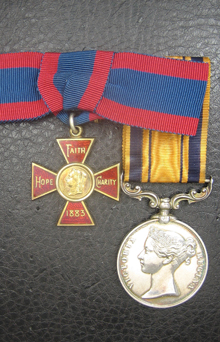
ROYAL RED CROSS, 1ST CLASS, V.R., GOLD AND ENAMEL, ON LADY’S BOW RIBAND; SOUTH AFRICA 1877-79, NO CLASP ‘MRS. J. C. DEEBLE, ‘’SUPERT. OF NURSES.” ’.
Royal Red Cross London Gazette 25 May 1883: ‘for Zululand’; presented by the Queen at Windsor.
Jane Cecilia Deeble (née Egan) was born on 28 May 1827 in Halifax, Nova Scotia and married an army surgeon who succumbed to disease during the Abyssinian Campaign of 1868. Possibly due to the death of her husband, that same year, Mrs Deeble entered St Thomas Hospital as a Probationer of Florence Nightingale’s training school. Joining the military establishment on 1 November 1869, she became Superintendent of the Staff of Nursing Sisters at the Royal Victoria Hospital at Netley and in 1870, Lady Superintendent of the Army Nursing Service, taking over from the unpopular Lady Jane Shaw Stewart. Under her direction, the Army Nursing Service saw great developments and slowly expanded, Mrs Deeble, who gained immense popularity, was at its head for a record 21 years.
A pioneering woman of army nursing, she lobbied for nurses to accompany the army on campaigns and finally in 1879 she was posted to South Africa, in charge of 6 Netley nurses for service during the Zulu War. These nurses under Mrs Deeble charge became the first nurses to officially serve with the British army on campaign. During the Zulu War, most of the Netley nurses were based at military hospitals at Pietermaritzburg, Newcastle and Addington near Durban. 7 nurses from the Stafford House Aid Society, who travelled to South Africa independently, also served during the Zulu War.
In October 1879, with build-up in forces for the Sekukuni campaign, a hospital was formed at Middleburg in the Transvaal to attend the sick and wounded, this staffed by Lady Superintendent Deeble and three of her Netley Nurses. The campaign itself lasted between November – December 1879 but Deeble and the nurses stayed on for some months attending the sick, not returning to Pietermaritzburg until 21 March 1880. After a short stay and joined by the other nurses, they sailed for Southampton to resume their duties at Netley.
Surgeon-General Woolfryes, principle Medical Officer in South Africa would describe the nurses service as:
“duties performed most zealously and efficiently, and their example of devotion to their duty having a most beneficial effect upon the orderlies of the AHC.”
and in his in his report to The Duke of Cambridge, he remarked that:
“..those belonging to Netley under Mrs Deeble and of the religious Communities did much excellent work and contributed very materially by their tender care and faithful nursing to alleviate the suffering of the sick and wounded. I may add that by their example they stimulated the Hospital Orderlies to practice with zeal in the performance of their duties”.
Newspaper reports that Deeble was sent out to South Africa again in late January 1881, this time for service during the 1st Boer War. However details of their service there has yet to be found.
In 1882, she was set to take charge of the nurses setting sail to take part in the Egyptian campaign, however in the event, she stayed at Netley and her service in South Africa would be her last campaign service. Further details of her life and service can be found later in this write up.
Invested at Windsor Castle from the hand of Her Majesty, Deeble’s Royal Red Cross was the tenth to be awarded following the inception of the decoration in 1883. Of the previous nine issues, eight had been bestowed upon ladies of royal or similar connections and the other on Florence Nightingale. Therefore, Mrs. Deeble’s Royal Red Cross must be considered the second to be awarded to an actual nurse. Prior to the Boer War, this new award to nurses was regarded as the nurses Victoria Cross, with only in the region of 80 additional awards being made between 1883 and 1899, some of these retrospectively to the Crimean War.
The recipient’s Army Service Record at this time adds: ‘Specially reported on for conspicuously good service. Highly praised for her administrative capacity and thanked by command of the Queen.’
A year later, in 1884, South Africa 1877-9 medals were awarded to the nurses who served in South Africa during the Zulu War. Just 14 medals were issued to nurses, all without a bar. A year earlier, medals had been awarded to nurses who served in the 1882 Egyptian campaign, so chronologically, medals to nurses who served during the Zulu war were the first awards to nurses but Egyptian campaign medals were the first actually awarded.
Interestingly, it was Superintendent Deeble that introduced the grey ward dress and short scarlet cape worn buy nurses of the Queen Alexandra's Royal Army Nursing Corps, the modern successor of the Army Nursing Service.
Condition NEF, One side of ribbon arm to RRC loose. Sold with copied research both paper and digital. Ex AA Upfill-Brown Collection, DNW 1991, where it hammered for the huge sum for the time of £3777.
A historically important and excessively rare Nurses pair of medals.